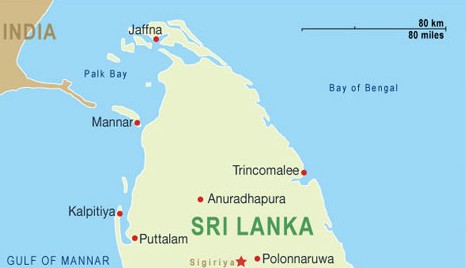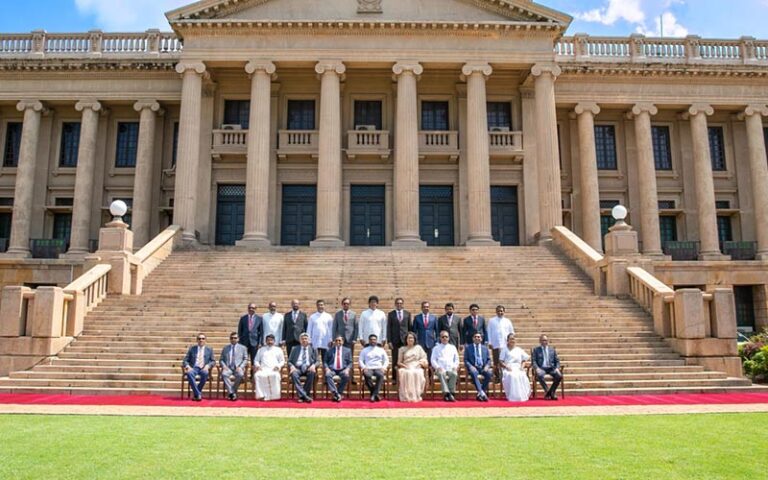 “I cannot go to the PSC with a clear conscience unless I have a commitment from Mahinda’’
“I cannot go to the PSC with a clear conscience unless I have a commitment from Mahinda’’
NEW DELHI, October 13: Tamil National Alliance (TNA) leader Rajavarothiam Sampanthan declared here today that Sri Lanka’s Tamils are prepared for a give-and-take with the Sinhalese to evolve a pragmatic solution to the festering ethnic problem.
In an exclusive two-hour interview to the Sunday Island here today, Sampanthan made it clear that his party is committed to finding “a reasonable, workable and durable solution within the framework of a united Sri Lanka.”
“The TNA is prepared to join the Parliamentary Select Committee (PSC) process to find such a solution. But, unless I have a commitment from President Mahinda Rajapaksa, I cannot go the PSC with a clear conscience. I am not prepared to betray my people,” the 80-year-old veteran leader proclaimed.
(Sampanthan and six other TNA parliamentarians have been in the Indian capital since Wednesday evening. On Thursday, they met Prime Minister Dr Manmohan Singh, External Affairs Minister SM Krishna, Prime Minister’s National Security Adviser Shiv Shankar Menon and Foreign Secretary Ranjan Mathai to put forth their point of view on the stalled political process to evolve a solution to the Tamil question in their country. (They called on Leader of the Opposition in the Lok Sabha Sushma Swaraj, and met representatives from a dozen European countries to brief them about the TNA’s stand on the peace process. Sri Lankan High Commissioner to India Prasad Kariyawasam hosted a dinner in the TNA MPs’ honour on Friday night. They will return to Colombo on Sunday).
Sampanthan, who has been elected to Parliament five times since 1977, pointed out: “For the PSC process to succeed in evolving a decent devolution package, there must be a consensus on the contours of a political solution among the major players in the island’s political life, namely: the governing Sri Lanka Freedom Party (SLFP), the main opposition United National Party (UNP), and the TNA.”
He made it clear that the TNA is not opposed to the PSC process per se. There have been seven rounds of talks between the Rajapaksa government and the TNA since Parliament passed the PSC resolution late last year.
The government delegation during these talks comprised only leaders from the SLFP. Notes were exchanged on all the issues. There were meaningful discussions on Mangala Moonesinghe’s proposals on devolution, the proposals put forth during 1995-97 and 2000 by then President Chandrika Kumaratunga, the ideas President Rajapaksa himself had put forth at the inaugural meeting of the All Party Representative Conference (APRC) in 2006, and those from the majority report of the multi-ethnic experts committee to assist the APRC.
On the basis of these confabulations, the TNA put forth a set of proposals on which the government representatives and the TNA had agreed. The TNA wanted the government delegation to commit to the proposals.
But there was no response from the government side for five months.
On 2 September 2011, Sampanthan met the President on the latter’s invitation. The President agreed to put on the table of the PSC the “consensus proposals” or ideas on which both sides had agreed during their deliberations, and requested the TNA leader to participate in the PSC process.
At a subsequent meeting, the President asked Sampanthan to nominate TNA representatives to the PSC so that it can begin its work. But the TNA leader declined.
He explained: “If we nominate our team, the President will call a meeting of the PSC. The TNA will boycott such a meeting unless the government agrees to put the “consensus proposals” on the table of the PSC. The government will then proclaim to the world that the TNA is not cooperating.
“That’s why I refused to nominate my team. But let me make it clear that we are not opposed to the PSC process. Let the government do what its representatives had agreed to during our talks: put the consensus proposals on the PSC table.”
Sampanthan also pointed out that out of the 31 members on the PSC, 19 will be from the government and 12 from the opposition, including maybe four from the TNA.
He added: “The PSC process may become infructuous if the government team outvotes the opposition on the proposals. Which is why we want a commitment from the President about the contours of a political solution before we join the PSC process.”
BY S VENKAT NARAYAN
Source: Island (Sri Lanka)




